Content
- The IAI joins the NBSAP Accelerator Partnership to boost global action on biodiversity
- Agreement between IAI and Red LabOT promotes the use of Earth observation technologies for decision-making
- The IAI takes part in the Global Ministerial Dialogue on Science Diplomacy
- Interview with Fernando Méndez, Paraguay’s national representative to the IAI
- IAI strengthens strategic alliances for action on the climate-health nexus
IAI Newsletter 2/25
The IAI joins the NBSAP Accelerator Partnership to boost global action on biodiversity

The Inter-American Institute for Global Change Research (IAI) has been officially recognized as a member of the NBSAP Accelerator Partnership, an innovative collaborative platform led by the governments of Colombia and Germany. This consortium aims to accelerate ambitious biodiversity actions, in alignment with the implementation of the Kunming-Montreal Global Biodiversity Framework (GBF) and the global vision of “living in harmony with nature” by 2050.
With this membership, the IAI reinforces its commitment to supporting its member countries in the development and implementation of stronger and more effective National Biodiversity Strategies and Action Plans (NBSAPs). From its approach based on transdisciplinary research and scientific diplomacy, the IAI will contribute to the regional coordination and collaboration necessary to halt and reverse biodiversity loss globally by 2030.
The NBSAP Accelerator Partnership promotes inclusive “whole-of-government and whole-of-society” approaches, encouraging the participation of countries, international organizations, indigenous communities, women, and youth. This comprehensive perspective seeks to strengthen the political and social visibility of NBSAPs, as well as to enhance the implementation of actions in all sectors.
As a member, the IAI promotes access to key services, such as:
- Intermediation mechanisms that connect the specific needs identified by countries in their NBSAPs with tailored technical and financial support.
- Facilitators to support the identification of requests and mobilize key actors in the implementation of NBSAPs.
- Learning and knowledge-sharing opportunities, fostering peer-to-peer dialogue and access to specialized resources.
This alliance represents a key step forward in regional efforts to address biodiversity challenges and reaffirms a shared commitment to a more sustainable future.
This partnership marks an important milestone in the region for joint efforts to respond to countries’ biodiversity needs, consolidating the common goal of a sustainable future.
For more information on the services of the NBSAP Accelerator Partnership, visit: www.nbsapaccelerator.org (in English).
IAI Newsletter 2/25
Agreement between IAI and Red LabOT promotes the use of Earth observation technologies for decision-making
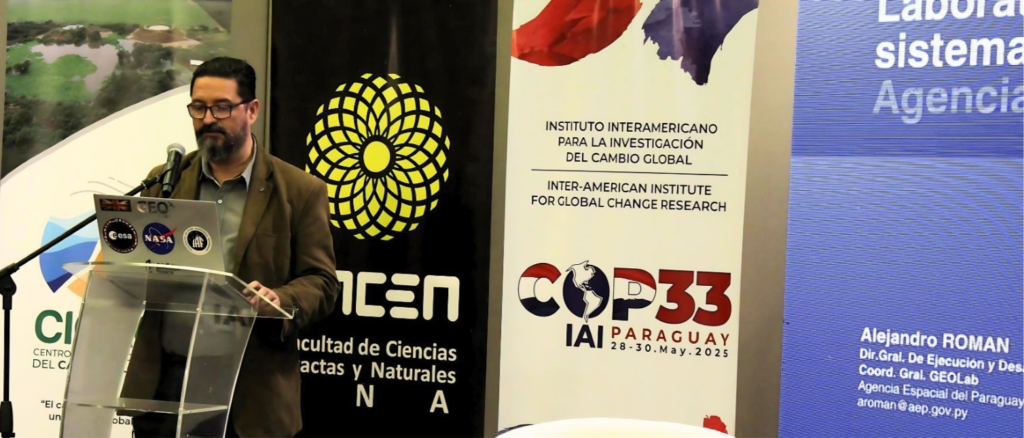
The Inter-American Institute for Global Change Research (IAI) and the Geo Labs for Earth Intelligence (Red LabOT) have signed an important collaboration agreement that seeks to promote access to and use of advanced Earth observation technologies in various sectors of society. This strategic alliance builds a bridge between science and action, with the aim of improving decision-making based on the use of timely geospatial data.
The agreement, with a central focus on the the strengthening of territorial intelligence, focuses on providing practical information tailored to the specific needs of local communities. Both institutions are committed to integrating Earth observation data and geospatial technologies to facilitate informed decisions in critical areas such as deforestation, disaster risk reduction, and climate change resilience.
The LabOT Network stands out for its participatory mechanisms, which enable communities to become directly involved in decision-making processes. This methodology recognizes local perspectives and experiences as essential elements in policy design and the implementation of concrete actions.
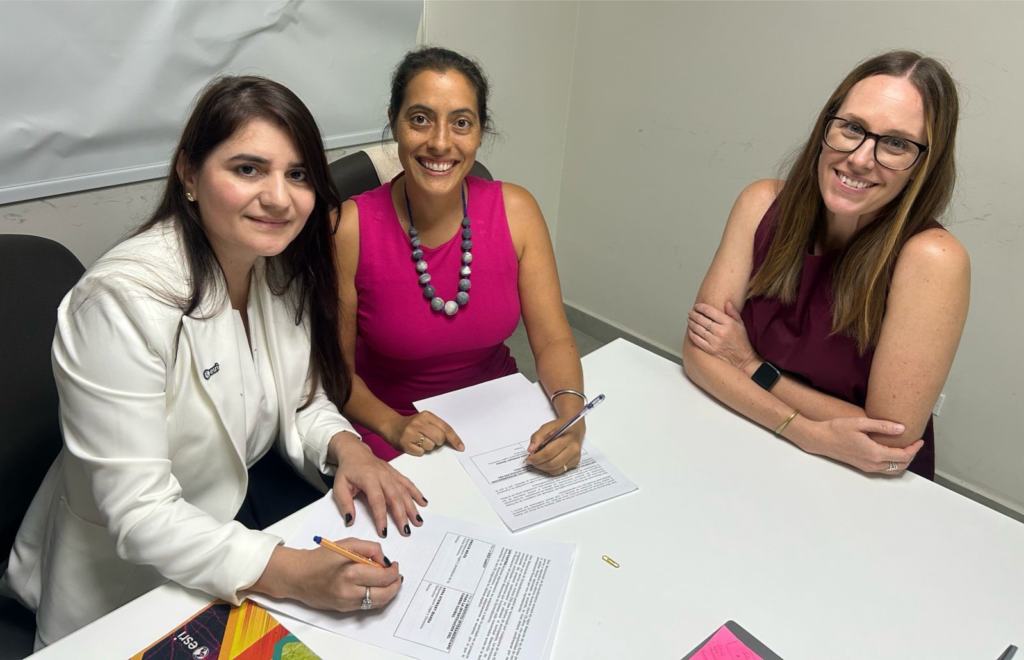
The collaboration between the IAI and Red Labot began in 2024, when both institutions actively participated in Geo Juvex, an international event held in Panama that brought together more than 1,000 young people. During this event, high school students and geospatial professionals collaborated on solving local problems such as deforestation, drought, the impact of the Panama Canal, and solid waste management.
The agreement between the IAI and Red LabOT also marks the beginning of a new phase in the collaboration between the two organizations, with the launch of internships for young Geo Juvex participants. María Sepúlveda and Marialicia Casas have begun their internships at the IAI in collaboration with Red LabOT, supporting the implementation of ecosystem-based adaptation (EBA) projects in the region.
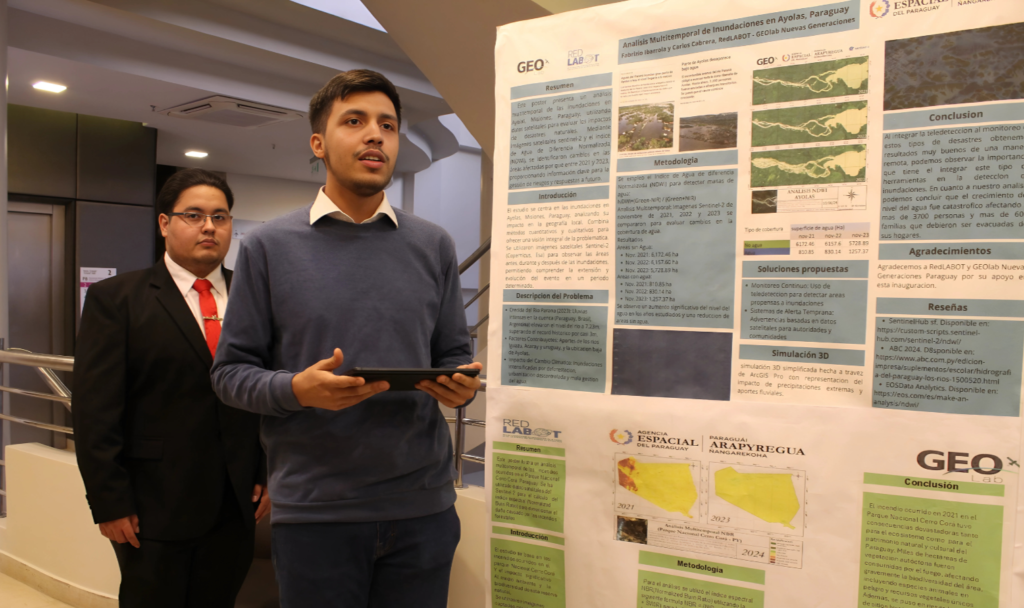
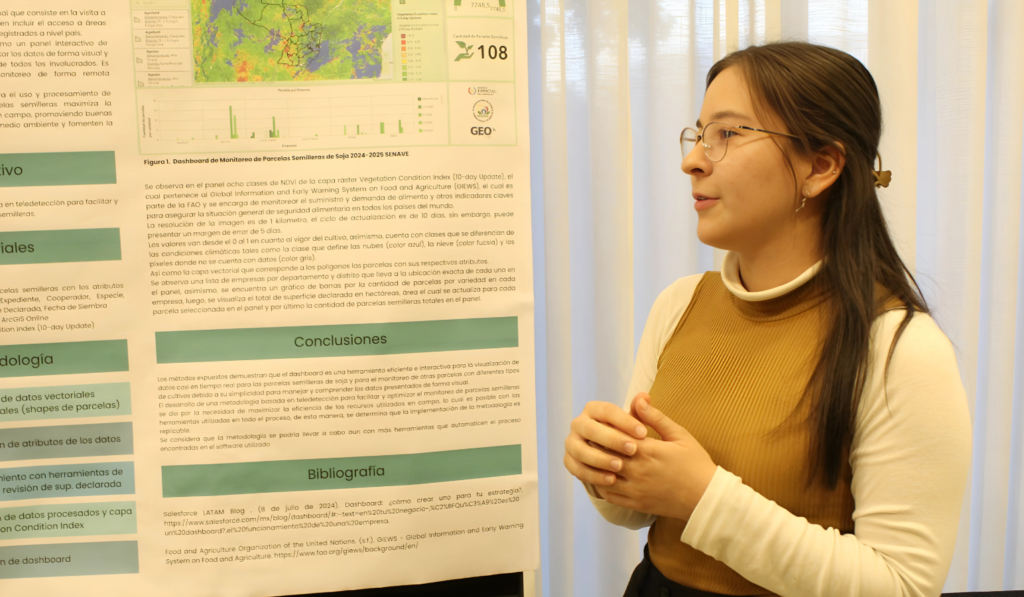
As part of this commitment, RedLabOT invited four students to present scientific posters at the 33rd meeting of the Conference of the Parties (COP33) of the IAI in Asunción, Paraguay. The Paraguayan Space Agency (AEP), one of the founding members of Red LabOT, invited students participating in the AEP’s GEOLab capacity building program and RedLabOT to conduct fire analysis in protected wilderness areas, flood monitoring, and agricultural monitoring using satellite data.
With this alliance, the IAI reinforces its commitment to sustainable development and the integration of science in local and international action to address the environmental challenges of the present and the future.
Learn more about Red LabOT (in Spanish).
Read the text of the agreement between the IAI and Red LabOT (in Spanish).
IAI Newsletter 2/25
The IAI takes part in the Global Ministerial Dialogue on Science Diplomacy
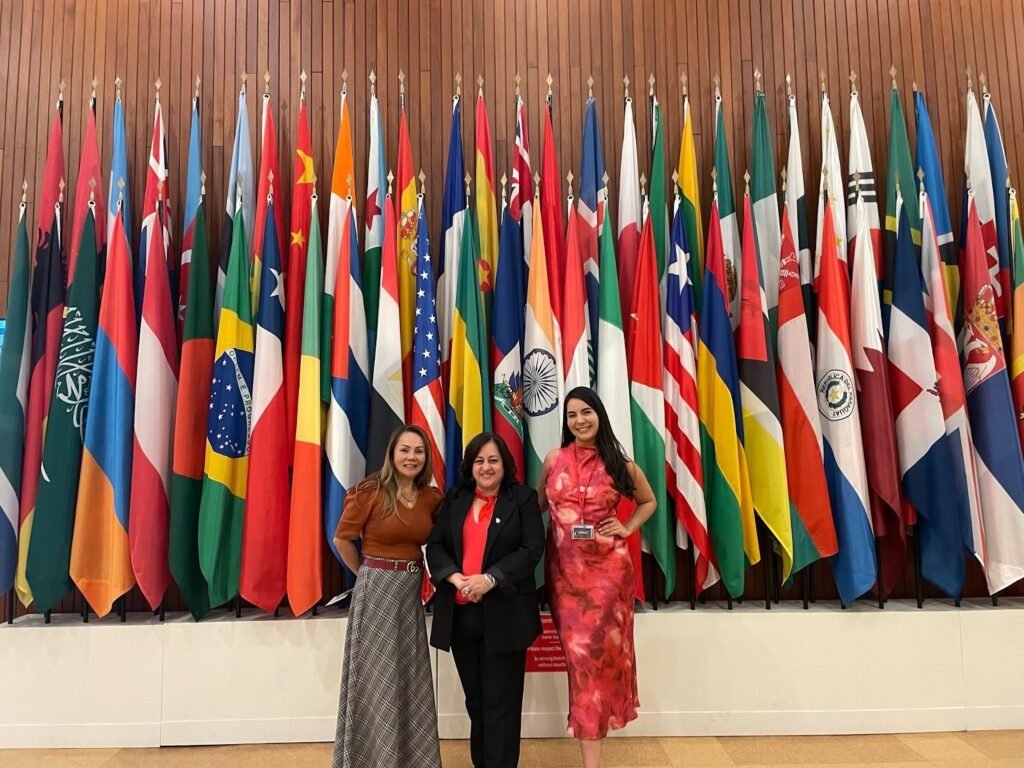
In the photo: Marcella Ohira (left), IAI; Gabriela Montenegro, SENACYT Guatemala; Claudia Alarcón, IAI
In March 2025, the Inter-American Institute for Global Change Research (IAI) participated in two key meetings on science diplomacy held at UNESCO headquarters in Paris.
The IAI’s Executive Directorate took part in the Global Ministerial Dialogue on Science Diplomacy (March 25 and 26), a high-level forum that brought together policymakers, scientists, and diplomats to strengthen international cooperation in the face of major global challenges. Its participation underscored the IAI’s strategic role in integrating science into foreign policy and building international partnerships.
On March 27, the Deputy Executive Director and Director of the IAI’s Center for Science Diplomacy, Marcella Ohira, was a panelist at the Workshop on Training in Science Diplomacy: Objectives, Practices, and Recommendations, organized by the EU Science Diplomacy Alliance and UNESCO, with the support of the European Union. This workshop, held in a hybrid format, aimed to transform the commitments made during the ministerial dialogue into concrete actions to strengthen scientific diplomacy capacities at the global level.
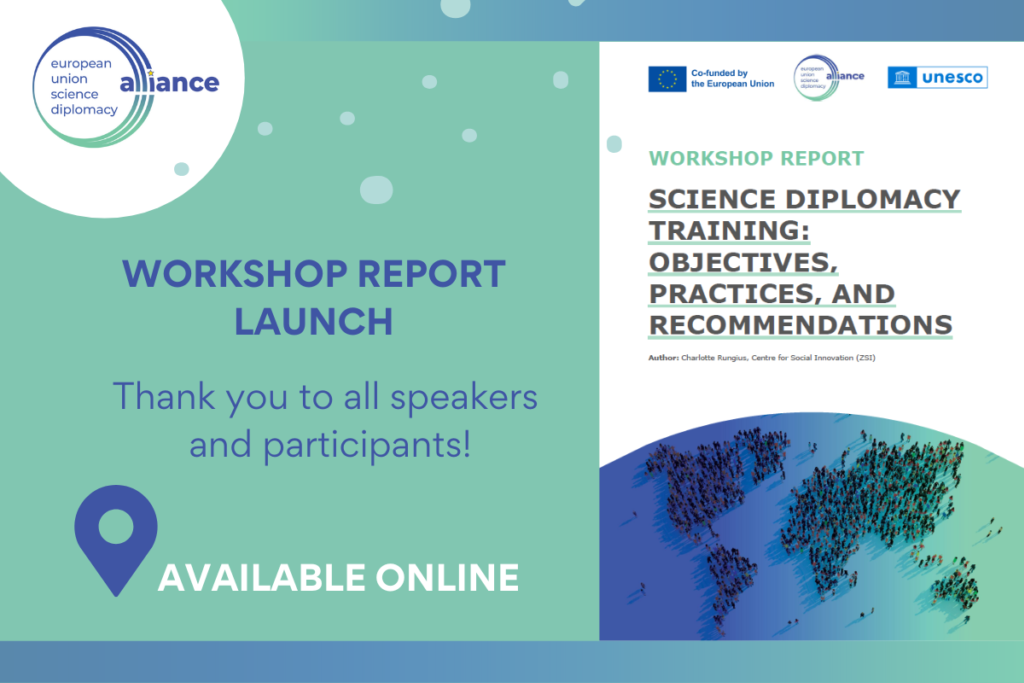
Alongside Marcella Ohira, two members of the Advisory Board of the IAI’s Center for Scientific Diplomacy also participated as panelists: Marga Gual and Kim Montgomery. The event provided a platform for sharing experiences on training initiatives in scientific diplomacy in the Americas and other regions, highlighting good practices, gaps, and recommendations for adapting training programs to diverse audiences, including scientists, diplomats, and policymakers.
One of the highlights of the workshop was the presentation by Franklin A. Morales, head of International Technical Cooperation at Panama’s National Secretariat for Science, Technology, and Innovation. Morales emphasized that “there is no need to reinvent the wheel” and called for efforts to focus on existing initiatives. In this regard, he highlighted the IAI’s Center for Scientific Diplomacy as a key option for strengthening capacities in the region.
The IAI’s participation in these forums reaffirms its leadership in promoting international scientific cooperation and its commitment to developing capacities to collectively address the challenges of global change through science diplomacy.
See the full agenda for the event at: https://www.science-diplomacy.eu/media/Agenda_Workshop-on-Science-Diplomacy-Training_27-March-2025-speakers.pdf
See the full workshop report at: https://www.science-diplomacy.eu/news/workshop-report-release-science-diplomacy-training.
IAI Newsletter 2/25
Interview with Fernando Méndez, Paraguay’s national representative to the IAI

Fernando Méndez Gamboa is a professor at the Faculty of Exact and Natural Sciences of the National University of Asunción (UNA) and Paraguay’s permanent national representative to the IAI. He specializes in exact sciences and works in the fields of physics, mathematics, statistics, and geology. His field of knowledge is atmospheric physics, a field he became interested in through his participation in the annual meeting of the IAI Conference of the Parties in 2009, held in Bogotá, Colombia.
What is the role of the IAI in Paraguay and what impact do you think the institution has had?
The IAI is a fundamental institution; it opens very concrete doors for scientific development. Each member country has a focal point, and we are the IAI in our respective countries. This means that, beyond representation at the Conference of the Parties, we must promote its scientific potential in our communities. I have met Paraguayan colleagues who, through IAI activities such as workshops or conferences, ended up doing master’s or doctoral degrees and even joined international research networks.
What are Paraguay’s current priorities in terms of global environmental change?
Global environmental change encompasses multiple dimensions: climate change, desertification, and biodiversity loss, among others. In the last five years, Paraguay has faced severe events, such as three consecutive years of the La Niña phenomenon, which caused a drastic drop in rainfall. This has impacted our river transport (vital for a landlocked country), our economy, and our agricultural and livestock production. It is no longer just an environmental problem: it has direct social and economic consequences. That is why our projects today also involve the social sciences and seek to influence public policy, not just produce academic articles.
How is academia linked to the public and private sectors in Paraguay?
Over the past three years, we have strengthened collaboration with these sectors. A concrete example is the creation of the Center for Research on Global Environmental Change. This center brings together eight of the country’s ten universities, the private sector (productive, industrial, and services), and the public sector (such as the Ministries of Environment, Agriculture and Public Works). The goal is to generate relevant science that responds to society’s needs and can also be translated into public policy.
How does Paraguay collaborate with other countries in the region?
We participate in research projects, workshops, and regional networks. Some Paraguayans have taken part in IAI science diplomacy workshops, and we are now organizing one in Paraguay, together with the IAI Conference of the Parties. Science diplomacy is key today because many environmental problems require international negotiations. One example is the recent need to reach bilateral agreements with Brazil to guarantee hydroelectric power generation in Paraguay.
What kind of training are future professionals receiving to face the challenges of global environmental change?
Today, disciplines such as economics, law, physics, and climatology all have a role to play in global environmental change. At the faculty, we have created a Master’s degree in Global Environmental Change, developed with the support of the IAI. It is virtual and open to students from across the region. We also offer programs in sustainable development. A degree is no longer the end goal: continuous training is key.
Based on your international experience, what global trends are shaping this field?
One of the major trends is the use of technologies such as artificial intelligence. It is no longer the future, it is the present. This requires updating curricula and institutional capacities. Another key aspect is international agreements, which require countries to develop resilience to adapt to global changes. In Paraguay, for example, there is tension between reducing emissions and maintaining a strong agricultural and livestock model. That is why it is essential to negotiate well at international tables and design realistic strategies.
What opportunities and challenges does the IAI face in the future?
The IAI is a great opportunity for countries, but it also requires commitment. The responsibility cannot be left entirely to the institute: countries must act as active partners. This includes maintaining or increasing contributions, providing financial support, and taking advantage of its programs. More workshops, more scholarships, more research. But that is only possible if there is shared responsibility.
What message would you like to share with readers?
In 2025, Paraguay hosted two important IAI events: a workshop on science diplomacy and the Conference of the Parties. It was an opportunity to position the country in these debates. We want to invite everyone to learn about and take advantage of what the IAI offers the Americas; it is an institution that opens doors, connects, and builds the future.
See the full interview here: https://youtu.be/xQJYIaXUq8k
IAI Newsletter 2/25
IAI strengthens strategic alliances for action on the climate-health nexus

As part of a series of high-level meetings, the Inter-American Institute for Global Change Research (IAI) consolidated key partnerships with the World Meteorological Organization (WMO), the World Health Organization (WHO), the Rockefeller Foundation, and Wellcome, with the aim of strengthening climate and health action in the Americas and globally.
In Geneva, IAI Executive Director Anna Stewart-Ibarra met with WMO Secretary-General Celeste Saulo to explore opportunities for inter-institutional collaboration on climate challenges in the region. Among the main topics discussed was the need to further integrate science and meteorological services into climate decision-making, with an emphasis on Nationally Determined Contributions (NDCs) and community-based early warning systems.

During the event “From Risk to Readiness: Harnessing Weather and Climate Information for Health,” held as part of the 77th World Health Assembly (WHA77), Stewart-Ibarra participated in the panel “Accelerating the Agenda.” She shared the stage with Meghan Bailey, Head of Social Protection and Health at the Red Cross Red Crescent Climate Center, in a discussion moderated by journalist Tulip Mazumdar.
Both panelists agreed on the urgency of adopting comprehensive and multisectoral approaches to address climate and health challenges. They also highlighted the value of strategic partnerships, active listening, and science diplomacy as key tools for driving coordinated and effective responses
The Executive Director of the IAI presented the work of the institute and its Center for Science Diplomacy, emphasizing the importance of linking science and public policy through capacity building. As an example, she mentioned the STeP fellows program, which prepares a new generation of professionals working at the science-policy interface, capable of addressing complex challenges such as the health-climate nexus.
These actions reflect the IAI’s commitment to more inclusive, scientific, and effective climate and health governance for the benefit of the populations of the Americas and in line with the main international frameworks: the Paris Agreement, the Sendai Framework for Disaster Risk Reduction, and the United Nations Convention to Combat Desertification (UNCCD).

Finally, during the 33rd meeting of the Conference of the Parties to the IAI (CoP-33), held in Asunción, Paraguay, from May 28 to 30, 2025, the WMO was officially announced as an associate institution of the IAI, marking a new chapter in a long-standing collaboration between the two organizations.





